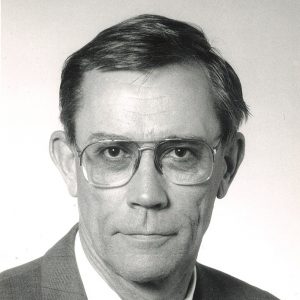calsfoundation@cals.org
Joseph Kirby "Jodie" Mahony (1939–2009)
Joseph Kirby Mahony II, who was known by the nickname “Jodie,” was a lawyer and politician who spent nearly forty years in public life, all of them in the Arkansas General Assembly. He was elected to the Arkansas House of Representatives at El Dorado (Union County) in 1970 and served twenty-eight years there and another eight in the Senate, rarely drawing an opponent in sixteen elections. When the state’s term-limit law barred him from running again in 2006, he returned to help House speakers and education interests. Seven governors, from Dale Bumpers to Mike Beebe, drew on Mahony’s talents, but he refused to be the floor leader for any of them, because it would restrict the range of his work.
Jodie Mahony was born on September 12, 1939, at El Dorado, one of three sons of Emon Mahony and Mabel Farmer Mahony. His grandfather, great uncle, and father, as well as both brothers, a cousin, a niece, and a nephew, were lawyers, the family having practiced law in the city continuously since St. Patrick’s Day 1896. His mother passed the bar exam, though she never graduated from law school or practiced law. Mahony attended Washington and Lee University in Lexington, Virginia, and the University of Arkansas (UA) in Fayetteville (Washington County) but graduated from Southern State College in Magnolia (Columbia County), now Southern Arkansas University (SAU). After serving in the U.S. Marine Corps, he earned a law degree from the University of Arkansas School of Law and joined the family firm Mahony and Yocum.
In addition to their law practices, the Mahony family had extensive holdings in timber and oil, which together accounted for the lion’s share of wealth and economic activity in south-central Arkansas. In his years in the legislature, he avoided handling legislation benefiting either. Instead, he often sponsored tax legislation that increased the burden on those interests.
In 1970, he ran for a seat in the Arkansas House of Representatives and was elected easily. He was part of a tide of progressive politicians elected to state office that year, most notably Governor Dale L. Bumpers. Even as a freshman, Mahony sponsored numerous bills, engaged in floor debates, mastered the House’s arcane rules, and leaped into parliamentary wrangling. Mahony especially championed and wrote laws extending educational and healthcare rights to those with developmental disabilities.
Education became his central concern. Allied with a state representative from adjoining Ouachita County, Julian D. Streett, Mahony began to demand a system of accountability for the public schools. The state did not participate in a national testing system that would allow student achievement in Arkansas to be measured against that of the rest of the nation. He pushed for an objective outside study of Arkansas schools and the way and extent to which they were funded. It produced the so-called Alexander Report, written in 1978 principally by Dr. Kern Alexander, an Illinois education consultant. It concluded that Arkansas children would be better off in the schools of any other state. The report shamed the state and set off decades of reform efforts by governors from Bill Clinton to Mike Beebe. Mahony was centrally involved in all of them. He joked near the end of his career that critics of Arkansas education should blame him, because he probably wrote most of the school laws. He served many years on the Southern Regional Education Board.
When Governor Clinton called a special legislative session in 1983 to change the state’s system of funding public education and to enact other education reforms, Mahony handled the sales-tax bill that funded the reforms and sponsored or managed numerous other bills. Family members who had interests in the natural-gas industry were shocked when he introduced a bill sharply raising severance taxes on natural gas to help pay for school reforms. The bill failed.
In the last round of reforms in 2005, after the Arkansas Supreme Court mandated a much greater role by the state in paying for public education, Mahony and state senator Shane Broadway of Bryant (Saline County) developed a plan for the state to bear a large part of the cost of school buildings for the first time. In 2007, after he was barred by the state constitution from running again, he returned as an aide to the speaker of the House and helped craft the school-aid law that satisfied the Arkansas Supreme Court’s mandate that the state comply with the constitution’s requirement that the state provide a suitable education for every child. The Jodie Mahony Center for Gifted Education at the University of Arkansas at Little Rock was established in 2001.
Mahony sponsored so many bills and resolutions—more than 1,400 in all—that he scurried around the Arkansas State Capitol from committee to committee carrying his bills and research in a cardboard box, soiled by years of daily handling, rather than a briefcase. He was a familiar figure, with his expensive but rumpled blazers, wrinkled khaki pants, scuffed Gucci shoes, and mismatched socks. He smoked cigars when he was away from the capitol, snuffing them out and keeping the unburned stubs on top of a tire in the parking lot.
Despite having prostate cancer, he continued to go to the capitol for legislative work until 2009. A Democrat, he was a friend and ally of members of both parties. He died on December 5, 2009, and was cremated. The Leader, a semiweekly newspaper at Jacksonville (Pulaski County), wrote of his death in 2009: “He was just a legislator. But, man, what a legislator! William Faulkner was just a writer.” Mahony was survived by two sons and his wife, Bettie Anne Humphreys Mahony, who was an English professor.
For additional information:
Blomeley, Seth. “Mahony, School-Policy Lawmaker, Dies at 70.” Arkansas Democrat-Gazette, December 7, 2009, pp. 1B, 5B.
“Jodie Mahony, Man of the People.” The Leader (Jacksonville, Arkansas), December 8, 2009. Online at http://www.arkansasleader.com/2009/12/editorial-jodie-mahony-man-of-people.html (accessed May 24, 2017).
Oakley, Meredith. “Leaving a Legacy.” Arkansas Democrat-Gazette, December 9, 2009, p. 9B.
Ernest Dumas
Little Rock, Arkansas








I graduated with Ernest Dumas, and I served with Jodie in USMC. Jodie was a very caring and kind individual!